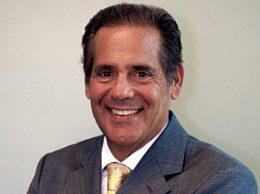Moorpark-based PennyMac Financial Services has filed papers for a $287.5 million initial public offering on the New York Stock Exchange.
The venture was founded in 2008 by Stanford Kurland, the former No. 2 executive at Countrywide Financial Corp., the defunct subprime mortgage lender at the heart of the financial crisis.
Moorpark Community Development Director David Bobardt said PennyMac now has more than 600 employees between two buildings on Condor Drive in Moorpark, making it one of the largest private employers and one of the biggest tenants in the city.
“It’s been good to have that kind of daytime employment coming back to the city,” he said.
The firm’s headquarters at 6101 Condor Drive used to be occupied by Card Services International, a credit card processing company, but sat vacant for years until PennyMac made the move into the 142,000-square-foot space in 2011.
“My understanding is [PennyMac] is still growing considerably,” Bobardt said, noting that employees at the firm in turn spend money at surrounding businesses and restaurants during the day.
Under securities rules, PennyMac is in a quiet period pending its IPO. In its filing, the company said it earned $60.5 million in the first nine months of 2012, compared to $11.5 million in profits in the first three quarters of 2011. The firm said it has been profitable every year except its first.
PennyMac’s investment management arm buys non-performing loans from banks — sometimes for pennies on the dollar — and then attempts to work with borrowers on alternatives to foreclosure. In regulatory filings, the firm has said banks are motivated to sell troubled loans, often at a significant discount, to free up capital and clean up their books.
PennyMac had $702.7 million in total assets as of Dec. 30, 2012, according to U.S. Securities & Exchange Commission filings.
The firm’s mortgage banking segment, PennyMac Loan Services, sells and services government-sponsored loans backed by entities such as Fannie Mae, Freddie Mac and the Federal Housing Administration.
PennyMac also originates loans through a retail mortgage lending operation, in which it makes loans primarily over the Web and through a call center, rather than a traditional bank branch network. The firm said it originated $534 million in residential mortgage loans last year, up 259 percent compared to 2011.
Countrywide connection
PennyMac founder, Chairman and CEO Kurland was the president and chief operating officer at Countrywide, the former Calabasas firm that had large operations in Ventura County. Kurland was once a candidate to succeed Angelo Mozilo as CEO of Countrywide, which the executives built into the largest U.S. home lender in part by offering complicated subprime mortgages to people with the weakest credit.
Kurland, who cashed in on about $200 million of Countrywide shares before his departure, left the home loan giant in 2006 because of disagreements with other officers about its risky lending practices, PennyMac spokesman Kevin Chamberlain told the Business Times in 2011. “He was really kind of pushed out,” Chamberlain said. “He did leave the company. He did leave because of disagreements over risk management.”
After Kurland left, losses on faulty mortgages drove Countrywide to the brink of failure. It was bought for $2.8 billion in 2008 by Bank of America Corp., which has since absorbed more than $40 billion in related costs. Bank of America Home Loans, as the operation is now called, is estimated to still employ thousands of people in Ventura County.
Regulators and lawmakers have blamed lax standards at Countrywide for contributing to the credit bubble and housing bust that followed, and Mozilo later agreed to a record $67.5 million settlement with regulators.
Kurland, who never faced regulatory action for his role at the mortgage giant, served more than two decades with Countrywide until his departure. His new venture now picks up the pieces of the real estate meltdown as it buys up nonperforming home mortgages from banks and collects what it can on them.
PennyMac has developed processes “to address the stringent requirements of residential mortgage lending and servicing in the post-financial crisis market,” according to its IPO filing.
Investment giants BlackRock and Highfields Capital helped found the firm and, along with Kurland’s family trust, are the largest shareholders in the firm, according to SEC filings.
With the continued overhang of the former Countrywide operations in Ventura County, PennyMac has access to a large pool of talent to draw from at its Moorpark location, which isn’t far from Bank of America’s mortgage processing center in Simi Valley.
But PennyMac’s Countrywide connections also pose a risk to the company. Certain other PennyMac officers besides Kurland also worked at Countrywide, and the Moorpark firm said in filings that it “cannot assure you that any existing or future investigations, litigation or negative publicity involving Countrywide Financial Corp. will not generate negative publicity or media attention for us or adversely impact us.”
Jason Arnold, a mortgage market analyst with RBC Capital Markets in San Francisco, told the Business Times that it’s different this time. The housing market has corrected itself and is on the path toward recovery, he said, but doesn’t show signs of overheating, as it did in the mid-2000s.
PennyMac is “focused on taking advantage of what really are some dislocations in the market,” Arnold said.
The mortgage market is regaining momentum, he said, and banks still have plenty of troubled loans to sell, often at a steep discount.
With PennyMac playing both sides of the coin, it can reduce its risk exposure somewhat, he said. “They’re originating new loans, servicing existing loans and being involved with other sorts of investments, so there are certainly some counter-balancing factors at play as well.”
Proceeds from the IPO will provide capital for mortgage banking and general corporate purposes, PennyMac said. “The shifting investment and operational priorities of banks and other traditional mortgage lenders have created additional opportunities,” PennyMac said. Among them are “the purchase from mortgage lenders of newly originated mortgage loans that are eligible for sale and/or securitization” through a government agency.
The latest IPO is not the first go around on the public markets for PennyMac, which took the real estate investment trust portion of the business public in July 2009. That IPO was met with lackluster enthusiasm from investors, as the company sold only 16 million shares — below the 20 million it had expected to sell for $20 each — out of the gate. The first public offering, under the ticker symbol PMT, raised $320 million for the Moorpark operation.
In a conference call discussing PennyMac Mortgage Investment Trust’s fourth-quarter 2012 earnings, Kurland told investors that the outlook for 2013 is bright.
“The stabilization in home values will have significant benefit for PMT’s portfolio of distressed mortgage loans and for the origination market as well,” he said. “Industry forecasts are calling for continued improvement in home prices, which positively impacts the value of the loans in our distressed whole loan portfolio and increases the demand for home purchases as well.”
Correspondent lending — loans originated by third-party firms — is also expected to grow, he said. The market is “targeting $4 billion in loan purchase per month by the end of 2013,” Kurland said. “This will occur through increased penetration in certain key products, primarily jumbo mortgages, and also by growing the network of approved sellers.”
The distressed loan market is also on the upswing. “We see new participants entering the market looking to sell legacy assets in order to clean up their balance sheets and free up capital. As a result, it is likely that this market remains strong for both non-performing and re-performing whole loans though 2013 and perhaps longer,” Kurland said.
Citigroup, BofA Merrill Lynch, Credit Suisse and Goldman, Sachs & Co. are the underwriters for the upcoming IPO. PennyMac did not give a price per share, a ticker symbol or a date for the offering.
— Bloomberg News contributed to this report.






 Print
Print Email
Email
















